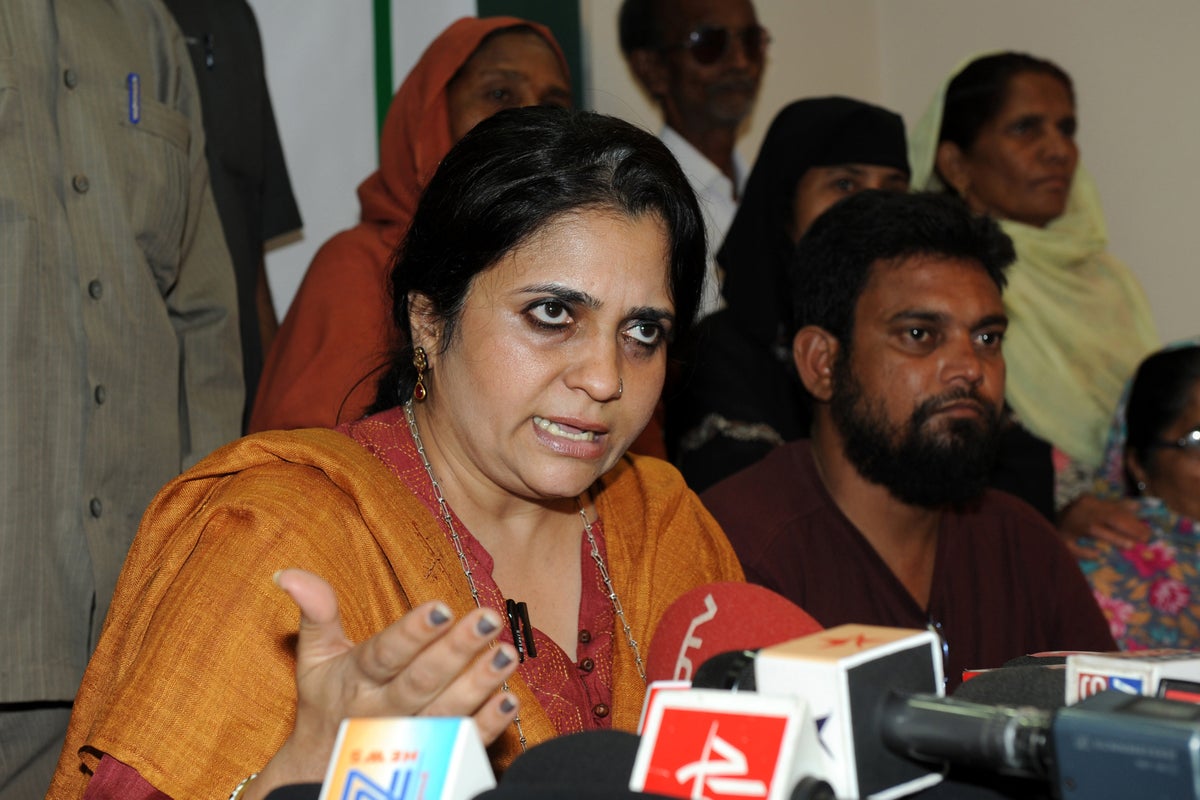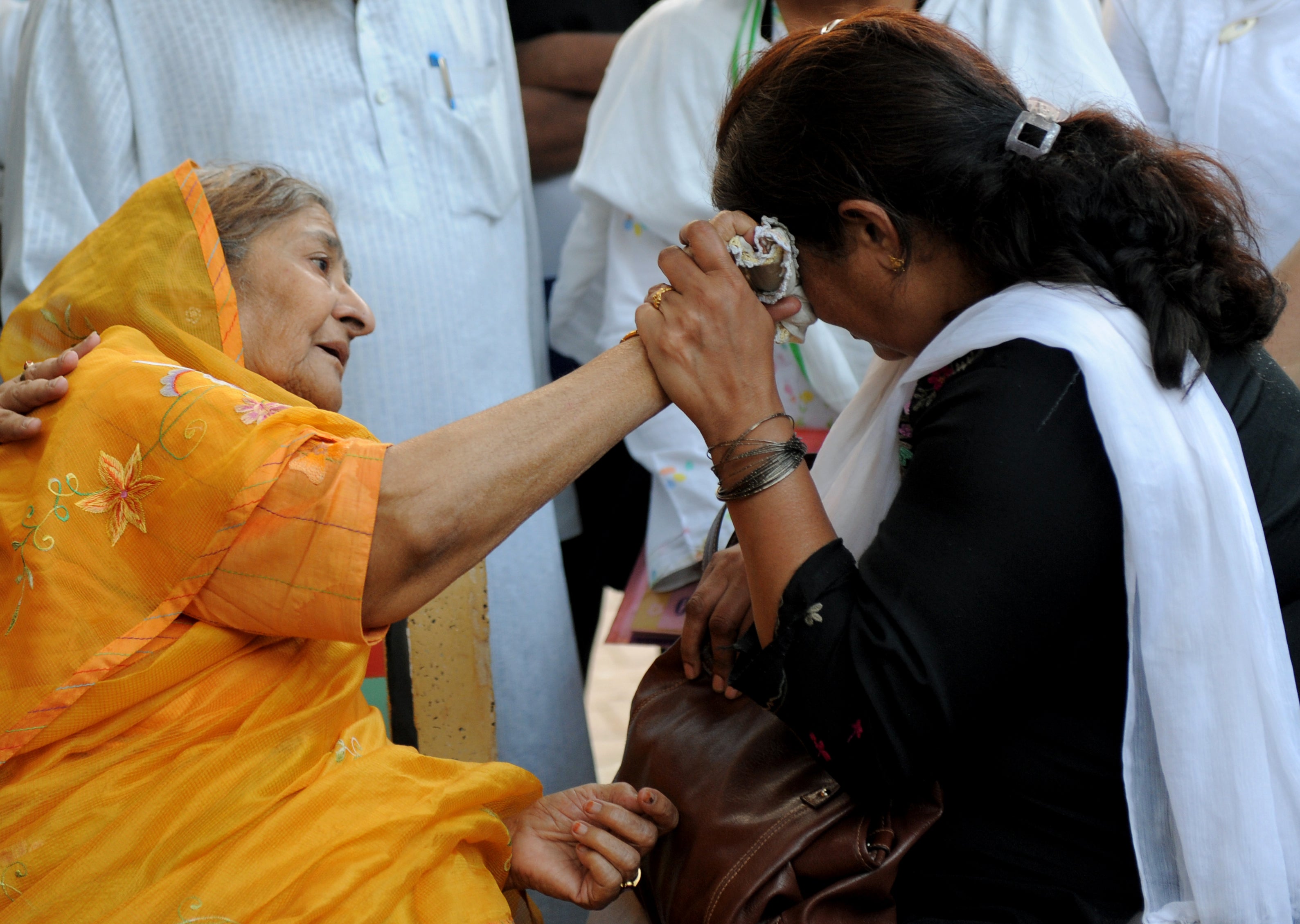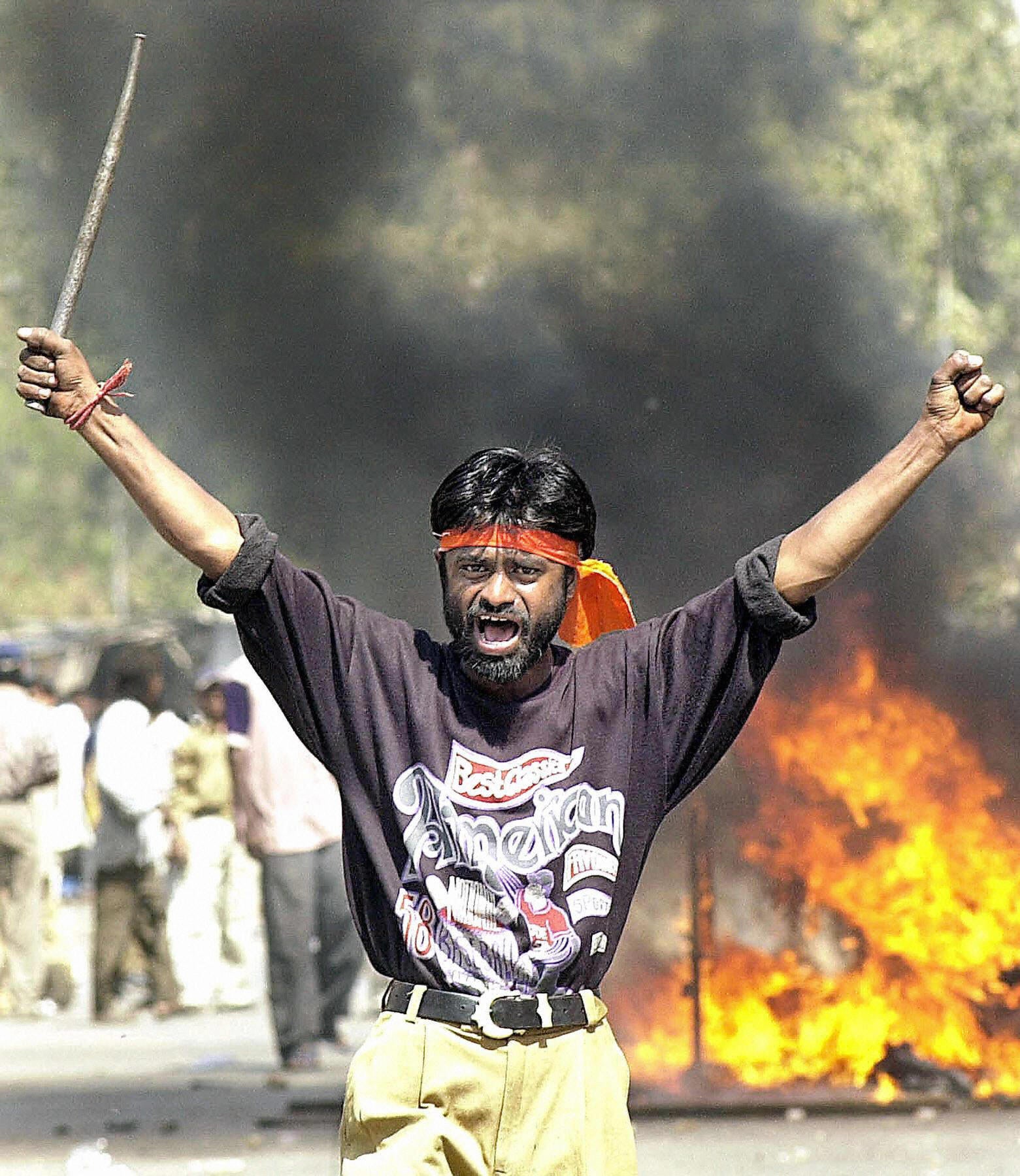
Indian police have arrested an activist who campaigned for decades to hold Narendra Modi accountable for his alleged role in the deadly anti-Muslim riots in Gujarat in 2002, a move that has sparked fresh fears of a crackdown against dissenters.
Teesta Setalvad was arrested on Saturday by the anti-terrorism squad (ATS) of the Gujarat Police based on a complaint alleging that she “exploited” the emotions of riot victim Zakia Jafri, the wife of former member of parliament Ehsan Jafri, who was killed by a rampaging mob on the morning of 28 February 2002.
Ms Setalvad, 60, now faces several charges, including giving or fabricating false evidence, false charge of offence made to injure and forgery for the purpose of cheating. Also accused with Ms Setalvad are two police officers from Gujarat, Sanjeev Bhatt – already in jail for another matter – and RB Sreekumar, who has also been detained.
The three are accused of conspiring to mislead the Special Investigation Team (SIT) tasked with probing the Gujarat riots and the role of Mr Modi’s state government at that time.
The arrest came just a day after India’s top court dismissed a petition filed by Ms Jafri challenging the acquittal of Mr Modi and dozens of other politicians in the riots case. The top court singled out Ms Setalvad in its order, stating that she was “vindictively persecuting” the dispute.
“Antecedents of Teesta Setalvad need to be reckoned with and also because she has been vindictively persecuting this [dispute] for her ulterior design by exploiting the emotions and sentiments of Zakia Jafri, the real victim of the circumstances,” the court order said.
Immediately after the court order was issued, a backlash against Ms Setalvad began from the prime minister’s inner circle and supporters.
Amit Shah, the current home minister of India and a close aide of Mr Modi since his time as Gujarat’s chief minister, hit out at Ms Setalvad alleging that she gave false information to the police in the riot case in order to frame Mr Modi.
Ms Setalvad runs an organisation called Citizens for Justice and Peace (CJP) set up in the aftermath of the deadly riots in 2002 when official tallies say a thousand people, the majority of them Muslims, died. Some unofficial tallies count the deaths as higher than 2,000.

The massacre in Gujarat is widely seen as an act of revenge led by Hindu extremists following an attack on a train in Godhra that saw 58 Hindu pilgrims killed. In the riots that followed many victims, including children, were killed by being burnt alive and the bodies were charred beyond recognition. Widespread destruction of properties was reported in areas where a large number of Muslims lived.
Mr Modi was accused of at least inaction in preventing the riots, and at worst of deliberately allowing them to run their course as a punishment of Muslims in his state. The allegations led to calls for Mr Modi’s resignation and condemnation from members of his own party at the time, and he was also banned from entering the US.
But repeated investigations have cleared Mr Modi and his state government of any wrongdoing, citing a lack of evidence, and on Friday the Supreme Court upheld an order to close the case. The US lifted its decade-long visa ban on Mr Modi after his election victory in 2014, when Barack Obama invited him to visit the White House.
Ms Setalvad’s arrest has sparked outrage from lawyers, rights activists and journalists who on Sunday described it as a step towards silencing Mr Modi’s critics.
“The Supreme Court has turned the Constitution on its head by targeting an individual for claiming rights,” wrote lawyer Karuna Nandy, reacting to Ms Setalvad’s arrest. “This goes against all our Court was congratulated for globally in the last 5 decades, however imperfect the system. Sad day.”
“When was the last time that an obiter [remarks] of a SC judgment became basis of a FIR [chargesheet]?” asked lawyer Anas Tanwir, who has represented many victims of hate crimes in India.
Mr Tanwir told The Independent that Ms Setalvad’s arrest was a “travesty of justice”.
“She [Ms Setalvad] had followed all the due process [in accusing Mr Modi]. She had filed petitions in the Supreme Court, which was her right. You cannot take action against someone for approaching court for something,” said Mr Tanwir.
The arrest was also described as persecution by international rights organisations, including representatives of the UN and Human Rights Watch.

“Very worrying to learn of the detention of Indian activist Teesta Setalvad who led the campaign for accountability for the 2002 riots in Gujarat. With India’s PM Modi at G7 summit in Germany, it’s critical that governments raise concerns about this case,” said Elaine Pearson, acting Asia director for Human Rights Watch (HRW).
“Deeply concerned by reports of #WHRD Teesta Setalvad being detained by Anti Terrorism Sqaud of Gujarat police. Teesta is a strong voice against hatred and discrimination. Defending human rights is not a crime. I call for her release and an end to persecution by #Indian state,” said Mary Lawlor, a UN special rapporteur on human rights defenders.
Ms Setalvad first accused Mr Modi directly in March 2007 when he was still chief minister of Gujarat. In a special criminal application before the Gujarat high court, she named herself as a co-petitioner alongside Ms Jafri, who had sought a legal complaint against Mr Modi and 61 other politicians, bureaucrats and police officers for their alleged role in allowing the riots to go ahead.
Ms Setalvad was awarded the prestigious Padma Shri, India’s fourth-highest civilian award, under the last Congress government. But she has also faced her own critics, having been accused of tutoring victims of the riots as well as alleged fund-raising irregularities.







